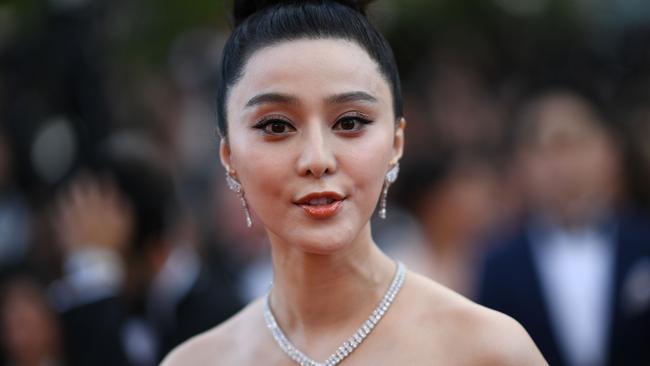Fan Bingbing busted in ‘huge tax fraud’
China’s highest paid actress, Fan Bingbing, has been ordered to pay more than $180 million in fines and back taxes.

A Chinese celebrity whistleblower has attacked the new film Air Strike as a “huge fraud” after China’s highest paid actress, Fan Bingbing, was ordered to pay more than $180 million in fines and back taxes.
Some of the income came from the 37-year-old’s appearance in the Chinese-made film starring US actor Bruce Willis, which is due for worldwide release later this month.
Mel Gibson was art director on the movie filmed in Shanghai in 2015, as a memorial to mark the 70th anniversary of the allied victory in World War 11. The film, called The Bombing in China, is about the Japanese air raids on Chongqing.
“The facts prove once again that Air Strike is a huge fraud,” former China state television talk show host Cui Yongyuan wrote on his social media account after the news of Fan’s charges and her grovelling apology on social media.
“One person who took part in the huge fraud has been punished,” Cui wrote.
It was revelations on Cui’s social media account about Fan’s movie contracts that led to her house arrest several months ago as authorities investigated allegations of tax avoidance.
Cui posted two contracts purportedly signed by Fan for another movie, Cell Phone 2, which showed two different fees – one only a fifth of the other, allegedly for the tax authorities. So called yin-yang contracts are rife in the Chinese film industry.
Fan has been a brand ambassador for Australian heath supplement company Swisse, and starred in X-Men: Days of Future Past, with Hugh Jackman.
It is not clear what Cui means by “huge fraud” but his access to Fan’s movie contract documents may show access to other information about the financing of films in China, where the government has moved to limit the total amount of money that movie stars can make.
Fan has until the end of the year to pay $US130m in back taxes and fines, or face criminal prosecution and jail time.
After news of the fines was announced by Chinese state media on Wednesday, Fan issued an apology on her Weibo account that appears to have been part of the settlement.
Even if she escapes a jail sentence, which looks likely, there are still questions about whether Fan can revive her career following such a public fall from grace.
The Australian sent emails yesterday to the Chinese owners of Swisse, the Guangzhou-based H & H Group, which proudly spoke to Australian journalists in Shanghai last November about Fan as a brand ambassador for the company in its November 11 Singles Day promotion, about future plans for using her, but received no reply by deadline.
The move is being seen in China as a continuation of the policies of President Xi Jinping, who came to office in 2012 with vows to crack down on corruption, including tax evasion by the wealthy.
His administration has ushered in a more austere regime where displays of ostentatious wealth are frowned upon and more controls are being implemented on social behaviour.
Even so, the move by Chinese authorities against their most high-profile international actress has sent shockwaves through the Chinese entertainment industry.
In a statement released this week, at the time the penalties were announced against Fan, China’s State Taxation Administration called on “other film and television firms” in China, “as well as relevant personnel”, to make remedial payments on their outstanding tax by the end of the year.
It said people who did not do this would be subject to “administrative punishment and penalties”.



